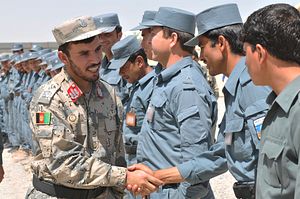Threatening to capture the provincial capital of Urzugan, Tarin Kot, Taliban militants stormed the city Wednesday and Thursday morning. Fighting was reported near the prison and governor’s house, with reports that local Afghan security forces and police had fled their posts.
Early Thursday morning, Taliban militants had captured the prison complex, but Afghan officials had already relocated the prisoners—highlighting a lesson learned from previous Taliban jail breaks.
By Thursday night, much of the fighting had subsided with heavy casualties on both sides. Bolstered by NATO airstrikes, reinforcements commanded by Kandahar’s feared police chief General Abdul Raziq, and accompanied by the 205th Maiwand Corps arrived at the city, pushing the Taliban back.
Reports estimate 180 Taliban dead and 75 wounded, while 11 Afghan police lost their lives.
A local resident of Tarin Kot reported that the situation was starting to calm, “This morning was very bad, but the security situation is better now,” he said. “This morning the circle of fighting was a kilometer or so from the main bazaar. The government and (officials) were all escaping to the airport and trying to get out to Kandahar.”
The Taliban have made several attempts at capturing Urzugan province this year. The embattled province is a major hub of opium and Taliban financing operations. In late May and early June, Taliban forces attacked and overran several police and army checkpoints in Gizab and Dehrawood districts, and on June 15, the resurgent militant group captured Char Chino district, killing 35 Afghan police and stealing a number of military vehicles and Ford Ranger trucks.
This is not the first time this year that Kabul has relied on Kandahar strongman General Raziq to stave off collapse of Urzugan, further highlighting Kabul’s reliance on warlords for its war strategy.
Earlier in May, General Raziq was, along with the 205th Maiwand Corps, dispatched in a major operation to open strategic roads leading from Tarin Kot to Shawali Kot in Khandahar province. Militants in the area increased attacks on outlying districts in an effort to isolate the populous city; the collapse of the province would provide the Taliban with a springboard to launch assaults into Helmand and Kandahar.
“If the provincial center is captured and liberated, it will inevitably be a huge blow for the enemy as they will lose their only toehold in the province,” Mullah Aminullah Yousuf, the Taliban’s shadow governor for Urzugan said.
On August 23, General Raziq’s forces were once again deployed on a nighttime rescue mission involving four Mi-17 transport helicopters to rescue Afghan local police who were surrounded in the Khas district of Urzugan province.
Raziq has become an indispensable ally of the central government, and a vital component of Ashraf Ghani’s war strategy in southern Afghanistan. The over-reliance on one man begs the question as to what will happen to the region should Raziq die in an operation and whether or not the Taliban strategy in the region is centered on forcing Raziq and his forces out of their stronghold in Kandahar.

































